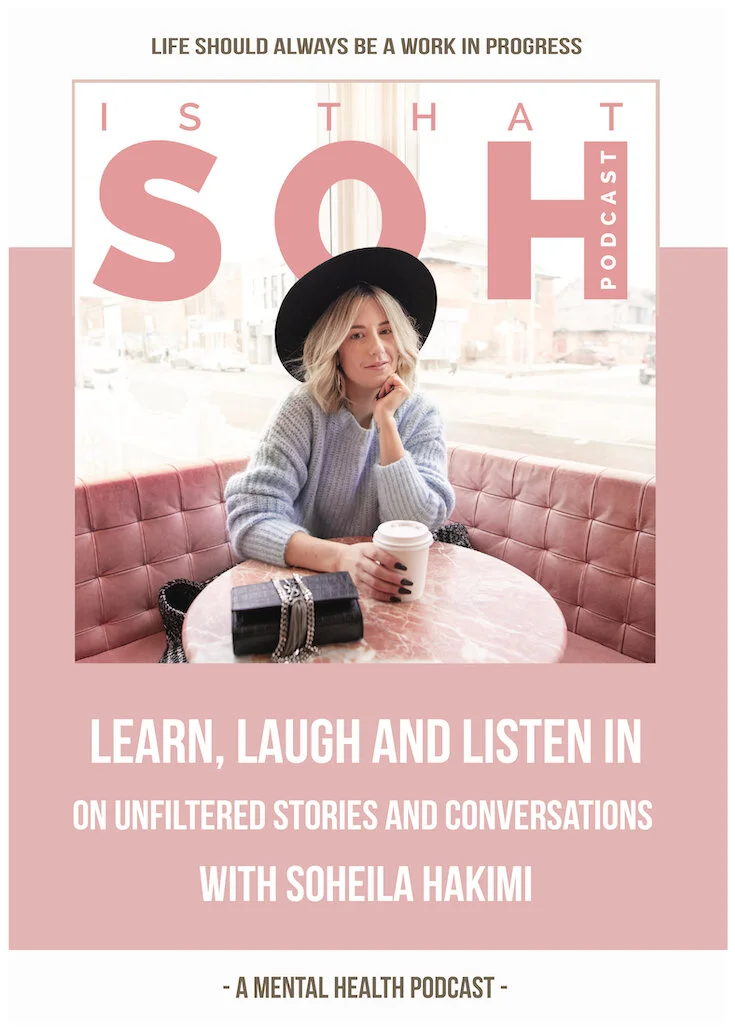EPISODE 16: #BLACKLIVESMATTER, WHITE PRIVILEGE AND HOW TO BE A BETTER ALLY WITH SARAFINA ARTHUR WILLIAMS
Hello Friends and welcome back to the Is That Soh Podcast!
Today on the podcast I have invited wellness psychologist and founder of Intentional Simplicity, Sarafina Arthur Williams to come on and educate us on the state of mental health in the BIPOC community, what white privilege is and how we can use it to help people of colour by being better allies.
The reason why I ask Sarafina to come on the show was because, even prior to the Black Lives Matter Protest this past summer and the death of George Floyd, I had listened to one or two conversations around white privilege and how to have conversations with people in marginalized groups about race, but it wasn’t until I sat back, muted myself and actively started to listen, that I notice how ignorant I was to ‘the black experience’, their history of oppression and injustice, and the place they hold on social media.
As someone who has black friends and even black relatives, I admit I have never tried to have conversations with them around race but this experience made me realize that maybe I should.
Even after examining my own social media feed, which was filled with predominant white faces it also made me ask myself, ‘How I expect to learn more about people in marginalized groups if I don’t show interest in people’s experiences that are different then my own.’
Further, since I have a particular interest in mental health, it worried me how, with all that is going on in the world, the BIPOC community is doing in terms of taking care of their mental health and if they are even able to get the help they need because:
1) you usually have to pay out of pocket for anything mental health related which can be a deterrent or barrier to seeking help and,
2) less than 2 % of mental health care practitioners are Black or African American and how can you expect those who need help to get proper help when those available to give it aren’t culturally competent enough to treat and understand specific issues as they relate to the black experience.
And so that is why I wanted Sarafina to come on and talk with us, because not only has she lived the black experience but she is a masters level psychologist who can relay her first hand insights and experience of growing up in the black community along with knowledge on the state of it’s mental health.
Sarafina Arthur-Williams is the CEO and founder of Intentional Simplicity LLC, a wellness-based mental health private practice. As a wellness psychologist and creative consultant, she educates her clients and mental health practitioners about positive psychology, art therapy, and the value of wellness and mindfulness. She is ranked on Feedspot’s top psychology bloggers of 2020 and features as a guest speaker on a variety of mental health platforms. To encourage sustainability, Sarafina documents how she practices wellness in her daily life through her online presence.
I hope you enjoy this episode as much as I did! Feel free to leave your thought below!
Also, special thanks to Mattias Friberg for composing the music for this podcast and perfecting my sound!
- BIPOC Mental Health Statistics -
Black and African American teenagers are more likely to attempt suicide than White teenagers (9.8 percent v. 6.1 percent).
16% (4.8 million) of Black and African American people reported having a mental illness, and 22.4% (1.1 million people) reported a serious mental illness over the past year.
Serious mental illness (SMI) rose among all ages of Black and African American people between 2008 and 2018.
Binge drinking, smoking (cigarettes and marijuana), illicit drug use and prescription pain reliever misuse are more frequent among Black and African American adults with mental illnesses.
Black and African American people are more often diagnosed with schizophrenia and less often diagnosed with mood disorders compared to white people with the same symptoms.
Additionally, they are offered medication or therapy at the lower rates than the general population.Black and African American people are over-represented in our jails and prisons. Black and
African American people make up 13 percent of the general U.S. population, but nearly 40 percent of the prison population. In 2016, the imprisonment rate for Black and African American men (2,417 per 100,000 Black male residents) was more than 6 times greater than that for white men (401 per 100,000 white male residents) and the imprisonment rate for Black and African American women (97 per 100,000 Black and African American female residents) was almost double that for white women (49 per 100,000 white female residents). [13] Black and African American people with mental health conditions, specifically those involving psychosis, are more likely to be in jail or prison than people of other races.Because less than 2 percent of American Psychological Association members are Black or African American
11.5 percent of Black and African Americans, versus 7.5 percent of white Americans were still uninsured in 2018.
In 2018, 58.2 % of Black and African American young adults 18-25 and 50.1 % of adults 26-49 with serious mental illness did NOT receive treatment
- Stats From Mental Health America - https://www.mhanational.org/issues/black-and-african-american-communities-and-mental-health
- Additional Resources -
- Where To Find Sarafina Online -
WEBSITE ▶ Www.LiveIntentionallySimplistic.Com
INSTAGRAM ▶ @intentional_simplicity_llc
FACEBOOK ▶ @intentionalsimplicityllc
Follow The @IsThatSohPodcast On Instagram!
If you have any comments or questions about this episode, feel free to leave them below

























